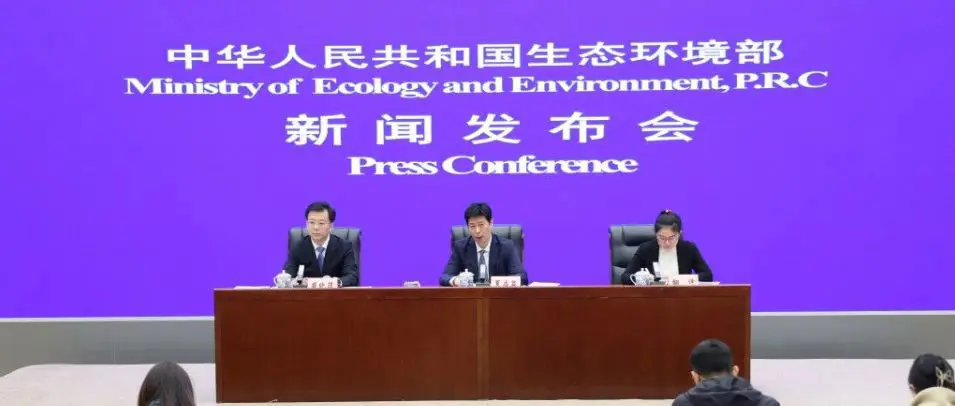Ministry of Ecology and Environment: Actively Promoting Carbon Trading in the Steel Industry, Currently Advancing the Urgent Compilation of Accounting and Verification Guidelines for the Steel Industry
On the date, the Ministry of Ecology and Environment held its monthly routine press conference. Xia Yingxian, Director of the Department of Climate Change Response at the Ministry of Ecology and Environment, attended the conference. Pei Xiaofei, spokesperson for the Ministry of Ecology and Environment, presided over the conference and both answered questions from reporters.

press conference site
Among them, in response to a question from the reporter of China National Radio, Xia Yingxian stated that to fulfill the task requirements of expanding the national carbon market as proposed in the annual "Government Work Report," the Ministry of Ecology and Environment has organized the preparation of the "Work Plan for the National Carbon Emission Trading Market Covering the Cement, Steel, and Aluminum Smelting Industries," solicited opinions from various parties, and issued implementation guidelines for the accounting and verification of the cement and aluminum smelting industries, among other technical specifications. At the same time, the Ministry is also advancing the urgent preparation of accounting and verification guidelines for the steel industry.
Next, the Ministry of Ecology and Environment will further implement the provisions of the "Interim Regulations on the Administration of Carbon Emission Trading," revise and issue supporting systems such as the "Measures for the Administration of Carbon Emission Trading," continuously consolidate data quality, crack down on illegal activities such as data falsification, actively promote the inclusion of the steel, cement, and aluminum smelting industries into the national carbon emission trading market, and accelerate the establishment of a more effective, dynamic, and internationally influential carbon market.
Please provide the specific content for translation.
CNR: The Ministry of Ecology and Environment has issued and implemented the "Total and Allocation Plan for Emission Allowances in the Power Generation Industry under the National Carbon Emission Trading System for the Year". Could you please provide an overview of the progress and achievements since the launch of the mandatory carbon market, as well as the plans and key tasks of the Ministry of Ecology and Environment for promoting the construction of the national carbon emission trading market?
Xia Yingxian: Thank you for your question. The national carbon emission trading market, which you just referred to as the mandatory carbon market, is an institutional innovation that leverages market mechanisms to control greenhouse gas emissions and promote green and low-carbon development. It is also a core policy tool for achieving China's dual carbon targets and the national goal of independently contributing to climate change mitigation.
The mandatory carbon market was launched and began trading in month and year. Our cumulative carbon emission allowance trading volume is close to 100 million tons, with a turnover of 10 billion yuan. The trading price has shown a steady upward trend and is currently fluctuating around 50 yuan per ton. The market is operating generally stable.
Since the beginning of this year, further progress and achievements have been made in market construction. Firstly, the institutional framework has been further improved. In a recent month, the State Council promulgated and implemented the "Interim Regulations on the Administration of Carbon Emission Trading," which holds significant importance as the first specialized regulation in China's climate change response. This regulation provides a legal basis for the construction of the carbon market. Together with over a dozen rules and technical specifications related to carbon emission accounting and verification, quota allocation, registration, and trading settlement, these form a multi-tiered and relatively comprehensive legal system for China's carbon market.
Second, we continuously strengthen data quality management. We uphold data quality as the "lifeline" of carbon market construction, continuously optimize carbon emission accounting and verification methods, implement a monthly certification system for key parameters, and carry out a three-level joint review at the national, provincial, and municipal levels to eliminate data quality risks early. Currently, the standardization, accuracy, and timeliness of market carbon emission accounting have been significantly improved, meeting the needs of stable market operation and providing critical data support for other related policies such as carbon footprint management.
Third, we have systematically carried out the issuance and settlement of allowances in the power generation sector and on an annual basis. We have organized the formulation of the "National Carbon Emission Trading Scheme Power Generation Sector Allowance Total and Allocation Plan for the Year", which is the plan you mentioned earlier. We have issued a notice on the allocation and settlement of allowances, and organized provinces and municipalities to allocate and settle allowances for multiple power generation enterprises, ensuring the stable and orderly operation of the market.
The fourth task is to lay the groundwork for expanding the scope of industry coverage. In response to the task requirements for the expansion of the national carbon market as proposed in the 2023 Government Work Report, we have organized the compilation of the "Work Plan for the Coverage of the National Carbon Emission Trading Market in the Cement, Steel, and Aluminum Smelting Industries," solicited opinions from various parties, and issued implementation guidelines for the accounting and verification of the cement and aluminum smelting industries, along with other technical specifications. We are also actively working on the compilation of accounting and verification guidelines for the steel industry.
Next, we will further implement the provisions of the "Interim Regulations on the Administration of Carbon Emission Trading," revise and release supporting systems such as the "Measures for the Administration of Carbon Emission Trading," continuously solidify data quality, strictly crack down on illegal activities such as data falsification, actively promote the inclusion of the steel, cement, and aluminum smelting industries into the national carbon emission trading market, which is the next step in our expansion plans, and accelerate the establishment of a more effective, vibrant, and internationally influential carbon market.

